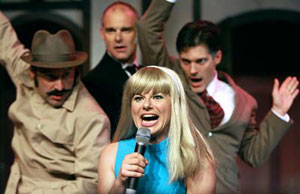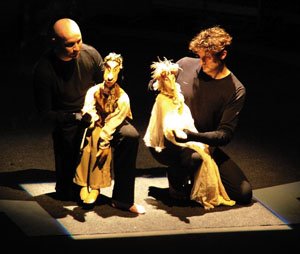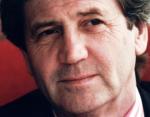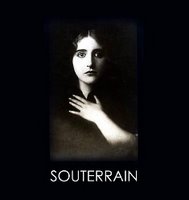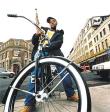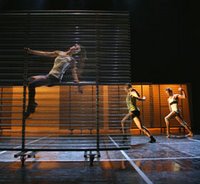The Arts tend to steer clear of this debate; for fear it may uncover some unpalatable truths. John Carey’s excellent book ‘What good are the arts?’ stirred things up last year and this debate is a direct result.
MotionAnyway the motion was, ‘An appreciation of the arts makes us better people – YES or NO’, and there was a great line up. Polly Toynbee chaired with John Carey and Blake Morrison arguing against, Howard Jacobson and Jude Kelly for.
Venue in motionCharleston is an odd venue. In fact it isn’t really a venue at all, merely a tent in a field, and the facilities are deplorable. It was cold, so we went for a tea in the café – our two cups were stewed and lukewarm. When we handed them back we were met with an astonished ‘this is Charleston dear, how dare you complain’ sort of look. We got our replacements, which were barely any warmer. They are in dire need of some professional catering. As for the tent, I can forgive the fact that it was blowing a gale and that we were all in danger of being wrapped up in a bundle and blown towards the Old Man of Wilmington, what was odd was the seating. If you sat in the wings, at least two of the contributors had their backs to you, and as for the two lamps, curtains and old school lectern, it looked like set of a third rate school play.
Vote 1 – a resounding YESThe good news is that the debate really was a debate, and it was one hell of a bu fight. The howling gale may have added to the tempo. We were all asked to vote YES or NO on entry and Polly read out the results:
216 - YES
40 - NO
46 - DON’T KNOW
Not surprising really, as this is a doubly, self–selected audience; those who love the arts and those who can get to Charleston. Then add in the factor that Charleston was the seat of some of the most arrogant of aesthetes. Carey attacked them with some venom in The Intellectuals and the Masses.
Eight minute presentationsJude Kelly
Jude Kell

y started by interrogating the question. By ‘us’ she wanted to be clear that the arts were for all and not the few. Actually she would have been better interrogating the more problematic words, ‘appreciation’, ‘arts’ and ‘good’. Unfortunately, her arguments were simple appeals to those she knew and had met. She quoted no independent evidence for her case at all. Her final appeal was to ask a different and unrelated question, ‘Would you like to see the Arts diminish?’ This was simply an emotional appeal to the audience.
Jo

hn Carey
If you’ve read the book you’ll know that he gathers a lot of evidence to support his case. These huge trials claim to show that an appreciation of the Arts does not make us morally better people. They make further claims that arts education does not lead to improvement in other subjects. The key references were Kreitler, Eisener, Laski and Bourdieu. He even makes a case for the arts making people worse, quoting a study that shows that actors and people working in the theatre “tend to be insensitive to other people’s feelings, treating them as objects to be amused, teased or manipulated”. He went on to claim that the arts, far from leading to democratic improvement, led to the reinforcement of social distinctions. As for ecstatic experience, he showed that sex and drugs were far more efficacious.
Howard Jacobson
Again H

oward made no appeal to evidence but went for the student debate approach. “Have you ever been burgled by someone who had read Middlemarch?" he asked. He thought that, far from merely relecting life, watching Macbeth allowed one to enter his head and see a deeper side to life and thought and that the Arts had a functional role in freeing us the “better to enjoy and endure life”. Jacobson was affronted at the very suggestion, by Carey, that the Arts do not lead to intellectual improvement. At this point I saw Carey take a careful note, for this was to be the undoing of the YES vote.
Blake Morrison
Morrison th

ought that this idea of Victorian moral improvement uncovered a great deal of snobbery and he detested this type of social engineering argument. If the arts are the great repository of moral values then why are so many of its creators so distasteful? We can count a great many unpleasant, immoral, amoral, fascist and dysfunctional people in their ranks. He then bravely had a go at Charleston and the Bloomsbury group. Interestingly, Carey steered clear of this, despite his attack on the Bloomsbury group in his book The Intellectuals and the Masses. Morrison also attacked the Arts establishment for being too narrowcast in ignoring film and television. The guy behind me guffawed at the very mention of the word ‘television’. He was not here for debate.
OK, the fight was on and Polly opened it up to the audience. I asked the first question, a retort to Jacobson’s idea that burglars would do well to read Middlemarch. “Many ordinary people may find that they themselves have been burgled by people who have read and own a copy of Middlemarch. Their hard earned taxes and money from the companies they buy goods from, is siphoned off to subsidise opera seats for those who can afford to pay for the seats themselves”.
It turned into real ding-dong with both sides hurling Middlemarch examples to and fro. Jacobson argued that he’d rather have a carer that had read Middlemarch than one that had not. Carey stated that it mattered not one jot that a carer had read Middlemarch and so on. I have to say that the questions and debate were excellent. The audience were genuinely engaged, asked many interesting questions, and many were clearly rethinking their position, apart, that is, from a solid core that clapped every time something was said about the high worthiness of the arts. One guy, with what sounded like a German accent, simply stated that he had listened to the evidence, and thought that Carey was right. Very Teutonic. There was also one very thoughtful comment from a woman psychologist who, I think had also changed her mind or at least had been convinced by Carey and Blake.
Vote 2 – a 175% swing!Rather than relate the whole debate, I’ll cut to the quick. The vote taken again, at the end, was astonishing.
187 - YES
110 - NO
53 - DON’T KNOW
The NOs had increased their share of the vote by 175%! Something else rather odd had happened here – see of you can spot the statistical oddity. We needed a four-wheel drive to get out of the field and sped back to brighton for a hot cup of tea.
*****
5 stars
Craig OgdenOgden played us a wide selection of classical guitar pieces from Baroque through Classical to modern pieces and jaz

z. I also liked his short interludes, where he explained some of the tricks of his trade. Apparently, if you break a nail, you cut a piece from a ping-pong ball and glue it on, layers of tissue paper and superglue also work. Digital delay, the reason for amplification, retuning to mimic a Baroque Lute.
There was a clever build going on here with melancholy pieces at the start from John Downland, through some mood pieces by the Brighton composer Paul Carr, some dazzling classical work by Sor and some Australian woks inspired by the Barrier reef islands. Finally, some fiendishly clever jazz pieces. Lovely encore with an arrangement of Waltzing Matilda! Made me walk out with a big smile on my face.
I wasn’t so keen on the Carr work, except for the 2 am piece. If you’ve ever gently plucked away on a guitar, on your own, very late into the night, you’ll recognise the beauty of the instrument when its played with the lightest of touches in private against the silence. On the other hand, seeing a virtuoso play such a range of styles makes you feel very inadequate.
These lunchtime concerts seem to be sell-outs and are very enjoyable, although I still think that closing the curtains on the huge windows on either side of the auditorium would create more atmosphere.
***
3 stars
 Nicolas Roeg is a film maker with a unique style. His montage effects, freewheeling approach to narrative, cross-cutting and atmospheric film making have given him a CV that puts him among the very best of British film makers. This session made you want to rush back to see Don't Look Now, Walkabout, The Man Who fell to Earth and Bad Timing.
Nicolas Roeg is a film maker with a unique style. His montage effects, freewheeling approach to narrative, cross-cutting and atmospheric film making have given him a CV that puts him among the very best of British film makers. This session made you want to rush back to see Don't Look Now, Walkabout, The Man Who fell to Earth and Bad Timing.




